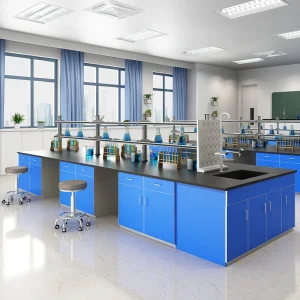Chemistry laboratories are specialized environments requiring specific furniture to ensure safety, efficiency, and functionality. This article outlines the key pieces of furniture found in a chemistry laboratory.
Laboratory Benches and Workstations
Workstations and Benches form the backbone of any chemistry lab. Designed for durability and resistance to chemicals, these benches provide a stable and safe surface for conducting experiments. High-grade materials like stainless steel or chemically-resistant laminates are common. They often feature built-in sinks, gas taps, and electrical outlets to facilitate various experiments.
Fume Hoods
Fume Hoods are critical for maintaining a safe laboratory environment. They effectively vent hazardous fumes and vapors away from the workspace, protecting lab personnel. Modern fume hoods are equipped with airflow monitors and alarms to ensure optimal safety. The size and specifications of fume hoods vary, tailored to the specific needs of the laboratory.
Storage Cabinets
Chemical Storage Cabinets are designed for the safe storage of chemicals. They come in different materials like metal or polyethylene, depending on the type of chemicals stored. Fire-resistant models are essential for storing flammable substances. Additionally, these cabinets often have lockable doors and spill-containment features.
Safety Equipment
Safety Stations, including eyewash stations and safety showers, are mandatory. They provide immediate decontamination facilities in case of chemical spills or splashes. Eyewash stations are typically built into laboratory benches for easy access.
Seating
Lab Chairs and Stools should be ergonomic, adjustable, and durable. They are often made of materials that are easy to clean and resistant to chemical spills.
Specialized Laboratory Furniture
Depending on the laboratory's focus, additional furniture may include:
- Microscope Tables: Specifically designed to reduce vibration and provide a stable platform for sensitive equipment.
- Balance Tables: These are designed to minimize vibrations and disturbances for precise measurements.

Utility and Flexibility
Modern laboratory furniture focuses on flexibility and adaptability. Modular furniture that can be easily reconfigured is becoming increasingly popular, allowing labs to adapt to changing research needs.
Cost and Specifications
When considering the cost and specifications of laboratory furniture, it's important to focus on:
- Power Requirements: Electrical specifications vary depending on the equipment used.
- Material Quality: High-quality, durable materials are crucial for longevity and safety.
- Dimensions and Space Efficiency: Laboratories must optimize space, making dimensions critical.
- Cost Efficiency: While initial costs might be high, durable furniture reduces long-term expenses.
- Efficiency and Speed: Furniture design can impact workflow efficiency and speed in the laboratory.
For detailed specifications and cost considerations, consulting with laboratory furniture manufacturers is advisable to ensure the right fit for specific laboratory needs.